ENERGY CONSERVATION
Conservation and You, Conserving Heat, Conserving Oil (Petroleum), Recycling
In 1900, there were about 1.6 billion people on Earth. Today, there are more than 6 billion. Each of these people will use energy. We must find ways to meet the demand.
It is easy to say that we should produce more and more energy, but many sources just won't last forever. Renewable sources cannot meet the demand. To make matters worse, using more energy will mean creating more pollution.
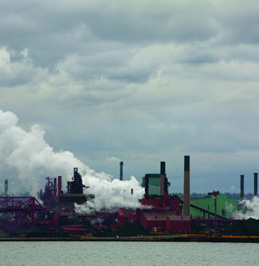 Power plants create pollution.
Power plants create pollution.
There are only two possible solutions. We can either find new energy sources, or conserve energy. Conservation is the wise use of the resources we already have.
Conservation and You
A lot of our energy resources go into producing electricity. You can help conserve electricity with the flip of a switch! The simplest thing you can do to conserve electricity is to turn things off. Turning off lights that aren't needed or televisions no one is watching can save lots of energy.
One of the biggest consumers of electricity in our homes is air conditioning. Try to use it only when it's really hot outside. Turn it off at night when the temperatures drop, or better yet, see if you can get by with just a plain old electric fan.
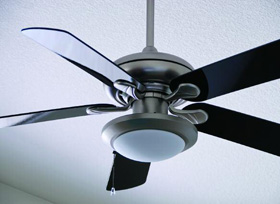 Running an electric fan can save you energy.
Running an electric fan can save you energy.
When your family goes shopping for major appliances, ask them to buy appliances that are energy efficient, which means they use less electricity. Most appliances today have a sticker that shows how much energy they use. Choosing ones that are energy efficient not only saves energy, but also saves money because of lower electric bills.
Conserving Heat
Most of the heat we use in our homes goes to heating the home itself or creating hot water. There are many ways to conserve both heat and hot water.
Adjusting your home's thermostat a few degrees lower can save a lot of energy over a long winter. An even better way to conserve is to keep the heat you do use in your house and keep the cold air out. A lot of heat escapes through doors and windows— even tiny leaks can let a lot of cold air in. While it is expensive to replace doors and windows, insulating them is much cheaper and will save money in the long run.
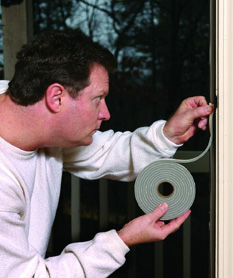 Weather stripping can protect your windows and doors from air leaks.
Weather stripping can protect your windows and doors from air leaks.
To save hot water, take shorter showers and baths. Putting insulation on your boiler saves energy by protecting the hot water from the cold air around it.
If your family is shopping for appliances that use hot water, such as a new hot water heater, dishwasher, or clothes washer, suggest buying ones that use less energy and hot water.
Conserving Oil (Petroleum)
Many homes are heated by oil, so you can begin to conserve oil by saving heat. Another major use of petroleum is in transportation. Petroleum is turned into the gasoline that powers our motor vehicles.
The easiest way to conserve oil is to walk! If you can't get to your destination on foot, consider other choices, such as bikes, buses, trains or carpooling.
If your family is considering buying a new car, you can help by encouraging them to buy one that gets good gas mileage. Using less gas means a car may end up costing less over the life of the vehicle, especially if your family drives a lot.
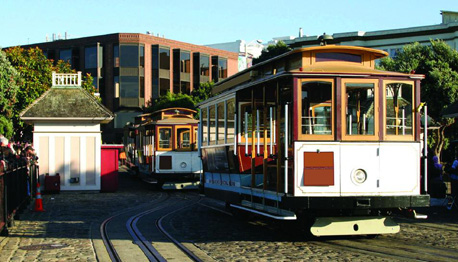 Trolleys are a good way to conserve oil.
Trolleys are a good way to conserve oil.
Recycling
Earlier on, we learned that about a third of the energy in the United States is used to make the things we buy. That's a tremendous amount of energy! It takes a lot less energy to reuse existing materials than it does to make new ones, so it makes sense to recycle.
Recycling is the process of treating materials so that they can be reused. These materials include newspapers, plastic and glass bottles, and aluminum cans.
 Newspapers are recyclable.
Newspapers are recyclable.
Much of the material that can be recycled today carries the international recycling symbol, which is three arrows chasing each other in a triangle. When you see this symbol, you'll know that you can safely recycle that material.
Many places are now recycling computers, stereos, TVs, and other electronic devices that used to be placed in landfills. The metal and plastic on these appliances can be reused. Even the ink cartridge on your printer can be recycled easily these days by bringing it in to a store.
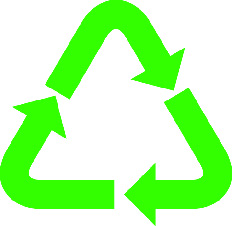
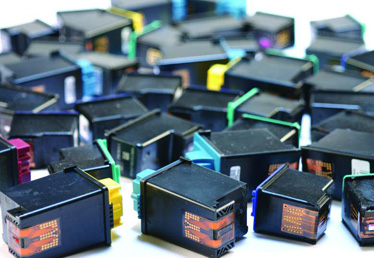 Ink cartridges are recyclable.
Ink cartridges are recyclable.
10 Easy Ways to Can Save Energy
You're just a kid! You can't help save energy, right? WRONG! There are many ways each and every one of us can help save energy every day. Here's a brief list of some easy ways to cut energy use. See how many others you can think of!
- Wash the dishes by hand instead of using the dishwasher, saving electricity and hot water.
- Keep the refrigerator door closed! Keeping the door open even for a short time allows a lot of cold air to escape.
- Unplug cell phones, computers, and even TVs when they aren't needed. They all use energy, even when they are turned off!
- Reuse supermarket bags. These bags are made of paper (from wood) or plastic (from petroleum).
- Ride your bike instead of asking someone to drive you to nearby places.
- Close the curtains. This can help keep warm air in your house in the winter, and prevent hot air from getting inside in the summer.
- Use a fan instead of an air conditioner.
- Hang laundry outside to dry instead of using a clothes dryer.
- Start a recycling drive at your school. Discuss with your teachers how you can recycle all the paper you use.
- Help educate others about saving energy. The more people you can get to join you, the more energy you'll help save!
Additional topics
- THE FUTURE OF ENERGY
- RENEWABLE VS. NON-RENEWABLE ENERGY - Non-Renewable Energy Sources, Renewable Energy Sources
- Other Free Encyclopedias